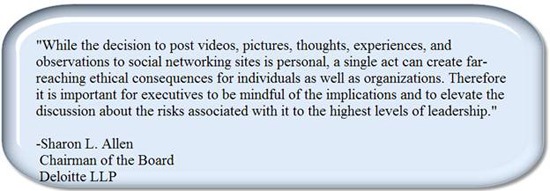How have companies with more than 1,000 employees been faring with employees and their social media use?
According to multiple recent studies, it appears that many companies have encountered problems and these problems are escalating.
Consider these results from a recent Proofpoint study examining how companies are managing their employees’ social media behavior:

- 17 percent disciplined an employee for violating blog or message board policies. Nearly 9 percent reported terminating an employee for such a violation (both increases from 2008, 11 percent and six percent, respectively).
- 15 percent have disciplined an employee for violating multimedia sharing/posting policies in the past 12 months, while 8 percent reported terminating an employee for such a violation.
- US companies are experiencing an increase in “exposure incidents” involving sites like Facebook and LinkedIn as compared to 2008 (17 percent versus 12 percent). US companies are now taking a much more forceful approach with offending employees – 8 percent reported terminating an employee for such a violation as compared to only four percent in 2008.
- Short message services like SMS texts and Twitter also pose a risk. 13 percent of US companies investigated an exposure event involving mobile or Web-based short message services in the past 12 months.
It appears employees are doing something wrong in their social media sharing, and they’re doing so in a pretty big way.
Interestingly, though, according to the Deloitte LLP 2009 Ethics & Workplace Survey, a mere 17% of companies have programs in place to monitor and mitigate the potential reputational risks related to the use of social networks.
There are clear-cut cases of right and wrong, but should employees be held entirely responsible for borderline transgressions in the absence of structure?
As social media continues to evolve, many companies continue to address problems reactively, as opposed to proactively. They are handling problems after they arise and are not giving their employees a clear, distinct direction to follow. In the absence of direction, employees are left to determine right from wrong on their own without knowing, or possibly thinking, how their activity relates to the company’s social media view. As the above studies show, this leads to unwanted conflict for both the employer and employee.
When asked how companies can keep their employees from doing stupid things online, Scott Monty, Head of Social Media at Ford Motor Company, had this to say:
“The same way it can keep employees from doing stupid things on email & the phone. Give them guidelines and resources. Have an online communications policy that follows standard communications policies and trust them to do the right thing.”
Scott’s views were echoed by corporate Twitter celebrity @RichardAtDell who simply says “educate and trust…short and sweet”.
I posed the same question to a broader group of social media experts. Here’s what they had to say…
“Most of our employees luv (SWA pun) their job! They are pretty cautious about what they say online. We encourage them to identify themselves as SWA Employees. Also, most of them are aware of what is considered confidential info, so they are cautious.”
Michael Brito, a social media enthusiast within Intel and respected writer of an informative social media blog:
“The reality is that you can’t. Trying to control human behavior in general is a difficult task. It starts with internal education, training, and establishing guidelines for employees. The caveat is that if employees are already online and using social media to communicate with others but NOT talking about the company in any way, companies have little to nothing they can say or react to. If an employee IS talking about the company in which they work for, they should be trained on what they should and shouldn’t say, especially when it involves around any legalities.”
“I don’t think I’ll tell you anything you don’t already know, but even though employees say their views don’t represent the company, they do. Also, it’s important to keep in mind the legal/regulatory impacts of any posts made in social spaces as a perceived representative of the company. It may not fit in all instances, but often employees don’t know what they don’t know.”
“Give your employees clear expectations if they’re going to engage openly online and also provide them with resources, so that if they’re confronted with questions, they’re not left making things up.”
Lee Odden of Top Rank Online Marketing:
“It comes down to explaining. Give examples of good/bad and establishing a social media guideline. Encourage self policing.”
“Make sure you don’t let your emotions get involved. Otherwise you take it personally and react instead of listening.”
“GM offers extensive social media training, administered by a 3rd party, for employees. GM encourages transparency and respect above all.”
UK SEO Consultant Ben McKay offers an agency’s perspective:
“If you’re managing a client’s social media, you need to work within brand guidelines. This is best enforced using a ‘rules of engagement’ doc that needs to be bespoke and written by the client and the agency together.”
There is a clear consensus among the experts that establishing social media guidelines, and training employees on the proper use of social media within those guidelines, are paramount to running a successful company.
Now that you recognize the importance of a social media policy, what should you consider when creating it?
You will find many examples of real social media policies at the bottom of this post but, unfortunately, no one can truly answer that question without consulting your individual company.
- There is no worldwide policy for social media usage and behavior.
- There are varying degrees of tolerance.
- There will be different levels of desired participation, different opinions on conflict resolution and different opinions on the overall value of social media.
There are, however, a few questions you should ask when considering how your company wants to proceed. Doing so can greatly help establish your plan of action and define your beliefs.
Five Things to Consider for your Social Media Guidelines for Employees
1. How does the use of social media affect employee productivity? Do you want employees accessing social media sites at work for either personal or business relations?
2. What legal issues do your company, or vertical, face regarding proper disclosure and/or advice?
After all, small print exists for a reason, and it’s usually not contained within 140 characters.
3. What restrictions should employees have when interacting? Like it or not, they will be perceived as a representative.
4. How will you train them on the use of these social media guidelines? It’s one thing to establish guidelines, but they’re failing if employees do not understand, or know, about them.
5. What will the repercussions be for violations? Are you willing to enforce them?
Please share your social media guidelines in the comments below.
22 Useful Social Media Resources
Do you need to establish social media guidelines? Here are 22 social media policy examples and resources.
- Dell Online Communication Policy
- Intel Social Media Guidelines
- Greteman Group Social Media Policy
- IBM Social Computing Guidelines
- Cisco Internet Postings Policy
- HP Blogging Code of Conduct
- Wells Fargo Community Guidelines
- Telstra (Australia) Social Media Guidelines
- Sharing Mayo Clinic
- BBC Guidance Personal Use of Social Networking and Other Third Party Websites
- Depaul University Social Media Guidelines
- Gartner Public Web Participation Guidelines
- About.com Blogging and Social Media Policy
- US Coast Guard Social Media Policy Part 1
- US Coast Guard Social Media Policy Part 2
- RightNow Social Web Employee Policy
- SAP Social Media Guidelines 2009
- Ottawa Public Library Social Media Guidelines
- Social Media Business Council: Disclosure Best Practices Toolkit
- Social Media and Social Networking Policies and Procedures Template
- Social Networking and Reputational Risks in the Workplace: Deloitte LLP 2009 Ethics & Workplace Survey Results
- The WOMMA Ethics Code
How do you feel about the Proofpoint case studies? Do you agree or disagree with the findings? According to a recent Deloitte study, this is how others feel:
- 74% of employees surveyed say it’s easy to damage a company’s reputation on social media.
- 58% of executives agree that reputational risk and social networking should be a board room issue, but only 15% say it actually is.
- 53% of employee respondents said their social networking pages are none of their employers’ business.
- 40% of business executive respondents disagree, and 30% admit to informally monitoring social networking sites.
- 61% of employees say that even if employers are monitoring their social networking profiles or activities, they won’t change what they’re doing online — they know it’s not private, and have already made significant adjustments to their online profiles.
- Would a company policy change how you behave online? 49% of employees say “no.”
Please share your opinions, experiences and ask all the questions you want.




